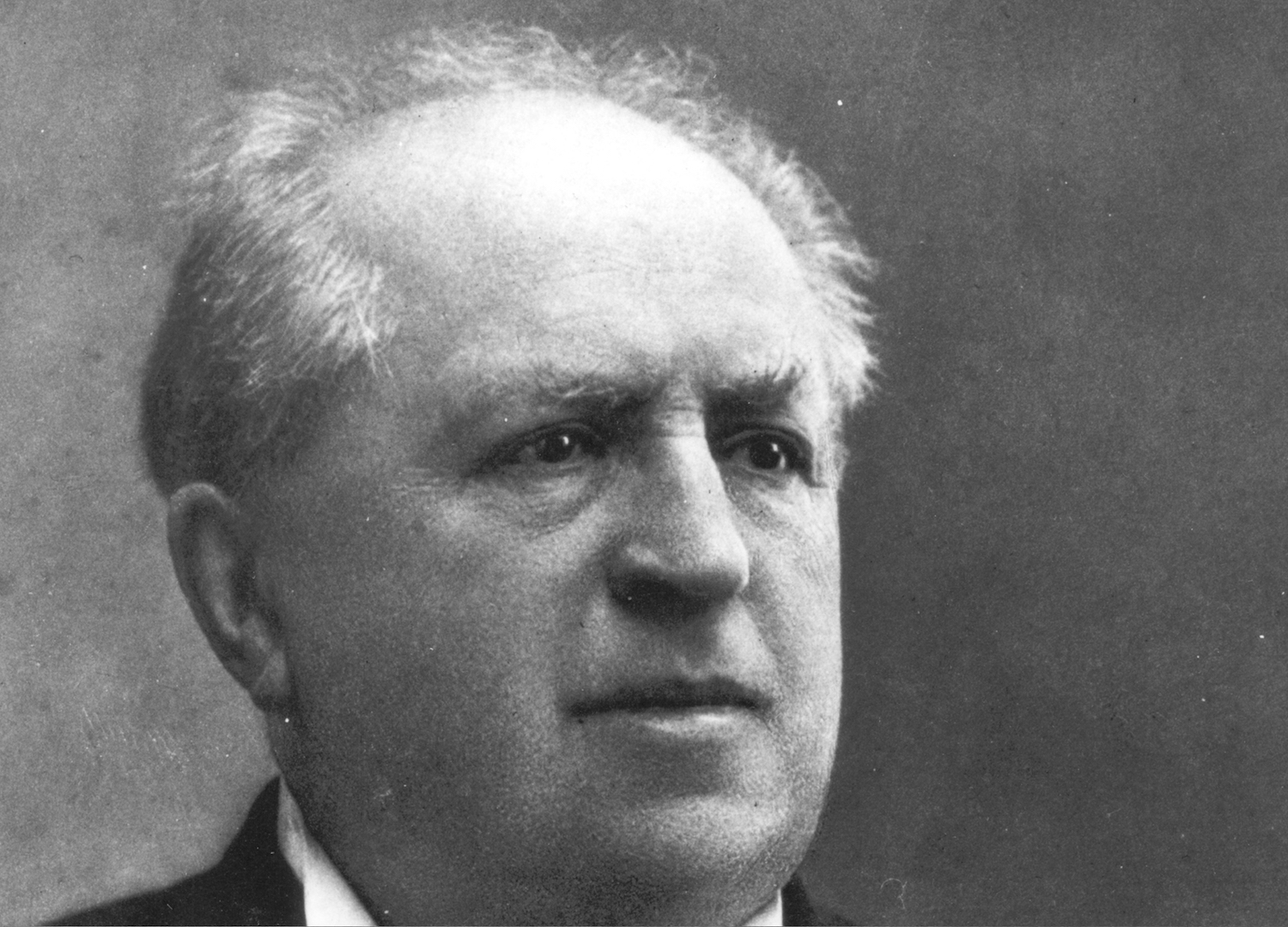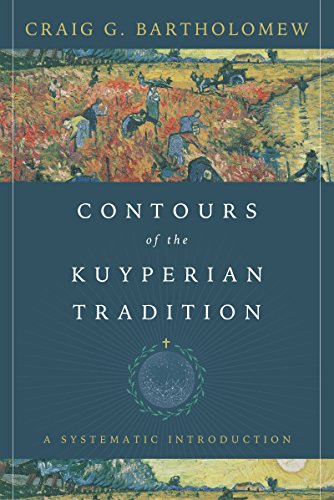

Kuyper was an extraordinary figure who is always difficult to describe briefly because he was so very much: a pastor, a theologian, an activist, a prolific author and journalist, and a politician and prime minister of the Netherlands. Courtesy, in particular, of the passion of the late Rimmer de Vries, whom we miss, more of AK is now in English than ever before. Indeed it was Rimmer who approached me about writing my Contours of the Kuyperian Tradition and who generously bought me out of two courses to do so. Two notes about my encounter with AK:

Firstly, I grew up in apartheid South Africa and was converted through vibrant evangelicalism of which I became and remain a part. However, white supremacy was legislated across the country and impacted every area of life. And it was done in the name of Christ. With time I began to think hard about the gospel and South Africa. A breakthrough came when I was able to name my faith as a “worldview” which related to all of life, including politics. Around this time I was introduced to the Kuyperians at Potchefstroom and Elaine Botha became a lifelong friend.
The gift of being an Evangelical was that it never occurred to me that the penetrating insights of the Kuyperian tradition could be anything but missional. It was a mystery to me how Reformed institutions could be turned in on themselves; it seemed to me then, as it does now, that the Kuyperian tradition yields a huge, biblical view of mission.
Secondly, I was introduced to the Kuyperian tradition through philosophers, i.e. through the tradition of Herman Dooyeweerd. Although I would not label myself as a Dooyeweerdian in the narrow sense of the word, I learnt an immense amount from him and the framework of Reformation philosophy informs my research on a daily basis. It was a great privilege to occupy the H. Evan Runner Chair for over a decade at Redeemer University in Canada, and to teach from this perspective. However, my sense is that Dooyeweerdians often feel that they have moved beyond Kuyper, and certainly I was not pushed to read Kuyper and Herman Bavinck but rather Dooyeweerd and the Reformation philosophers. This in itself is a big task but, in my view, has its dangers. Reformational philosophy emerges out of Kuyperian soil and it is not helpful if such philosophy loses its grounding in that soil. Writing Contours of the Kuyperian Tradition gave me an opportunity to immerse myself in Kuyper, and I found that experience wonderfully fruitful.
There are many good reasons for reading Kuyper, not least because more and more of him and his colleagues are available in English. Here I explore five of those many reasons.
1. BECAUSE OF HIS EMPHASIS ON PALINGENESIS
Kuyper is well known for reaching for biblical terms in Greek. Alas, they do not always communicate well. One such word is palingenesis, a jawbreaker of a word. This is a Greek word and how Kuyper leverages it is very important.
In Titus 3:5 palingenesis refers to individual conversion. The story of Kuyper’s own conversion is fascinating. Kuyper was a PK (preacher’s kid) and it was only while doing his PhD in theology at Leiden University that he came to a living faith in Jesus. Kuyper’s fiancée was preparing for confession of faith (confirmation) and Kuyper was arrogant and dismissive of her orthodoxy. As a gift his fiancée gave him the best-selling novel of the year in the UK, the Anglo-Catholic novel The Heir of Redclyffe by Charlotte Yonge. The Spirit did his regenerative work in AK through this novel. Initially he identified with the central arrogant character, but by the time this character comes to repentance and kneels to pray, so too does Kuyper.
The reality of conversion is thus utterly foundational to AK’s story and life, and so too ought it to be for us. The Kuyperian and Reformation traditions are intellectually robust and powerful, but they are of little value if loosened from a living faith in Jesus. As John 17:3 reminds us, this is eternal life, that you might know God, not just know about God, but know him cognitively and experientially. All else flows from this and flows back into this. Thus it is important, and I am most grateful, that in our circles we have someone like Mark Roques, who has developed the Kuyperian tradition creatively in relation to evangelism. We must never lose sight of this; the breadth of the gospel that the Kuyperian tradition opens up, is truly good news, euangelion, and it needs to be sounded forth continually.
Kuyper’s vast devotional writings also bear eloquent witness to the fact that conversion is the beginning of our journey into and with God, and not the end. I argue in my Contours that the greatest need of this tradition is spiritual formation, and I stick by that comment. Huge minds without parallel formation of the whole person in the image of Christ are of little value and easily become unattractive. In my Herman Bavinck lecture given last year at Kampen Theological University, I attend to Bavinck’s – and Kuyper’s – critique of mysticism and argue that this needs reassessment. As some of us have discovered the imperative of ongoing spiritual formation, we have found that our Protestant Evangelicalism has limited resources whereas Catholicism has a deep and long tradition. In my view we need to engage with that tradition but not uncritically. I have heard it said that spirituality has given prayer back to the church but taken away the Bible. We can never settle for such a situation. We need deep resources for spiritual formation, clearly normed by Scripture. Even as I say this I remind you that spirituality is a practice, not firstly a theory. Reading many books on prayer and spiritual formation will not do the transformative work that ongoing practices will achieve.
If in Titus palingenesis refers to individual conversion, in Matthew 19:28 it is used for the renewal of the whole creation. And it is this twofold usage that Kuyper leverages to great effect. A metaphor in Mark’s Gospel for becoming a Christian is entering the kingdom. In other words, when you become a Christian you automatically get caught up in God’s purposes for his whole creation, the missio Dei, so that the view of the world issuing forth from conversion is creation-wide. Thus, AK drives a bus through the sacred-secular dualism that so bedevils far too much Evangelicalism, and opens up the whole of life and every aspect of it for Christian service. All the creation and the whole of life are the terrain for the service of God. Every Christian, as Eugene Peterson puts it, is in holy orders. The only question is where and how we serve. Later in life, when giving his Stone Lectures on Calvinism, on which Peter Heslam has done great work, AK reached for the word “worldview” to capture this comprehensive vision.
2. BECAUSE OF HIS ATTENTION TO SCRIPTURE
AK had a front row seat as the modern approach to the Bible, historical criticism, took hold at Leiden and conquered most of the western academic world. Indeed, AK is credited with being the first to use the word “modernism.” Where AK was penetrating was in his discernment that historical criticism was one among many manifestations of the Enlightenment worldview. AK recognized that a piecemeal apologetic approach to the enlightenment would inevitably fail, and he recognized the need to counter one worldview with another. At the same time AK never made the mistake of ignoring the many good gifts brought by the Enlightenment worldview.
Neither AK nor Herman Bavinck were biblical scholars. Bavinck recognized the need for good, biblical work to accompany his and others’, and arranged as a stopgap for Matthew Henry to be translated into Dutch. Both saw the challenge presented by historical criticism and AK addressed it directly in two articles. Without denying the new insights of this critical approach to Scripture they saw clearly what was at stake if the authority of the Bible was undermined, and so should we.
Nowadays in theology, it is rare to find work that is deeply engaged with the Bible. This is one reason why Bruce Ashford and I recently published our The Doctrine of Creation: A Constructive Kuyperian Approach (IVP Academic, 2020). We want to promote and try to renew a form of theology that is deeply biblically engaged, and throughout the volume you will find small-font sections with Greek and Hebrew, as we endeavour to take the authority of the Bible with utmost seriousness.
Where is such theology to be found? In my view the theologian who is exemplary in this respect is Karl Barth. In one of his volumes in his Church Dogmatics on creation, he devotes some 100 pages to rich, small-font theological exegesis of Genesis 1. When I am working on biblical texts I nowadays reach for the index of the Church Dogmatics to see what Barth had to say. AK, as I have said, was not a biblical scholar, but he is like Barth in his commitment to engaging with the Bible. For example, in the first of his three big tomes on Common Grace, now available through the magnificent Lexham Series, volume 1 is primarily devoted to common grace in the Bible. Some of AK’s exegesis is fanciful and more eisegesis than exegesis, but he knew what needed to be done and he did his best.
Within biblical studies and the four Seminars that function as part of KLC, namely, SAHS, SADS, SACS and SAU, we have a significant group of Kuyperian biblical scholars. Mike Goheen’s and my The Drama of Scripture, draws deeply on the Kuyperian tradition and in particular the work of Herman Ridderbos. If our tradition takes scripture seriously, then such scholars will be in great demand, and amidst our current economic crisis we will be concerned to ensure they are in a position to continue their work. Of course, we will only see this if we are really committed to Scripture as God’s infallible Word for all of life, including philosophy and the academic disciplines. Much work remains to be done in this respect. Inter alia, there are resources within the Dutch biblical tradition that need to be excavated and translated, even as we advance this tradition in the present.
3. BECAUSE HE ASKS THE RIGHT QUESTIONS
When I left school I attended a small seminary in South Africa. It inducted me into the Reformed tradition, for which I remain very grateful. However, as is often the case with seminaries, it imparted information more than teaching us how to find answers for ourselves. It was my two years at Oxford University that educated me, teaching me how to explore and investigate for myself. As a professor my educational philosophy could, from one angle, be summed up as “Love the Question.” From day one of a freshman’s course with me, I would work to help each of my students find their voice, and to learn to ask their questions, however simplistic. Over the course of their education I would try to help them to learn to ask questions that open up a topic under discussion, laying bare its major components. A key to research is learning to ask the right questions.
What I love about AK and the Kuyperian tradition is that it asks and teaches me to ask the right questions, questions like:
• What is the relationship between nature and grace?
• What is the telos of creation?
• What is the implication of the sovereignty of God for social philosophy?
• What parts constitute a modern society and how do they relate to each other?
• What is a university?
• What is the difference between a seminary and a theology department at a university?
• Who is ultimately responsible for a child’s education?
• How does the antithesis manifest itself in different areas of life and what ought to be the Christian response?
• What should apologetics look like in a post-Enlightenment culture?
• How should we approach Christian involvement in a pluralist culture?
• What is the institutional church and how does it relate to the organic church?
And so we could continue. The Kuyperian tradition provides a vocabulary and a penetrating capacity for asking questions that open up a topic for analysis with nuance.
I take it from this that the Kuyperian tradition is made for the marketplace of ideas. I lament the fact that we have no institution of Christian Higher Education in the UK or Europe. I fully support the establishment of such institutions, but a concern of mine is that too many understandably withdraw in order to do their work, but never re-engage, the very thing they are designed for. Then they turn in on themselves and become unhealthy. Far from the Kuyperian tradition hermetically sealing off the boundaries and group for discussion, in my experience it sets one free to engage widely and deeply, learning from wherever one can. A review of one of my books criticized me for engaging too widely and labelled me ecumenical! I take this as a compliment.
Here again AK is exemplary. I recently published a book chapter on Abraham Kuyper and Science, attending in particular to his work on evolution. AK wrote this at the time when his wife died. From the notes he prepared for this talk it is evident that he consulted some 70 authors, including the leading authorities on evolution in his day in multiple languages, many of whom have entries on today’s German Wikipedia.

4. BECAUSE OF HIS FOUNDATIONAL WORK ON THEOLOGY
Within the analytic Reformed Epistemology and Reformational philosophy, the yields of the Kuyperian tradition in philosophy have been considerable. In the 1980s Time magazine reported that God was making a comeback … in philosophy. It named Alvin Plantinga as the premier Protestant philosopher of religion. The Reformed Epistemologists, rooted in the Kuyperian tradition, have gone on to do truly extraordinary missional work in establishing overtly Christian philosophy in the academy.
Far, far less has this been the case in theology. In my view systematic theology reflects on the great loci of Christian belief in the light of Scripture and the Christian tradition in relation to the major questions of our day. And in my view, as such it yields foundational insights. I differ from Dooyeweerd in this respect in that I see both theology and philosophy as foundational sciences. If this is right, then the absence of major theological work is a serious deficit in the contemporary Kuyperian tradition.
Fortunately, we have Gordon Spykman’s Reformational Dogmatics, and resources like the Dogmatics of G. C. Berkouwer, and the wonderful renaissance of Herman Bavinck’s work in recent years – largely a result of John Bolt’s labours – and most recently a great biography of Herman Bavinck. There are, of course, other works as well, such as those by Gijsbert van den Brink and Kees van der Kooi, which are becoming available in English.
I do not think one can write off AK and Bavinck as scholastic. This is too easy, and any such critique needs to define its terms carefully. We need a fresh flowering of Kuyperian theology today, and good news is that if The Doctrine of Creation sells well, it will become the first in a multi-volume, multi-author Kuyperian Dogmatics.
As a theologian AK’s magnum opus is his three-volume Encyclopedia of Sacred Theology, only part of which – mainly volume 2 – is available in English. As far as I am aware none of his Dictaten Dogmatiek is in English, nor is his E Voto, his commentary on the Heidelberg Catechism. In his Encyclopedia you get a sense of the stature of AK as a theologian and as a philosopher. In order to work out if theology is a science he has to work out just what is a science, and off he goes. Amongst so many insights David Bosch argues that AK is the first to develop a trinitarian approach to missiology.
There is rich material here that needs to be translated, excavated, and developed afresh for today.
5. BECAUSE OF THE FRUITS OF THE KUYPERIAN TRADITION
For a tradition to be worth inhabiting and nurturing it needs to have shown itself capable of bearing good fruit. In my view this is undoubtedly true of the Kuyperian tradition; indeed I have argued that its time has come. The Kuyperian tradition has yielded a great corpus of literature and practice which one could rehearse at length, and its influence is found nowadays sometimes in the most unusual places.

Let me be clear that I feel no compulsion to follow the Kuyperian tradition slavishly. It is to Christ and thus Scripture that we return to continually as our final authorities. And it must be noted that in some areas AK got it absolutely wrong. The lowest point of his work, in my view as a South African, was his support of the Afrikaners in remaining separate from coloured Africans. He rightly criticized British imperialism but was absolutely mistaken on the separation of the races in South Africa. This was a time when African converts and intellectuals were trying to find a path as Africans and intellectuals and Christians in relation to European thought and life. AK could have helped here but he did not, and it is a blemish on his legacy. Bavinck was far more enlightened on this issue, and his PhD students – unlike those of AK, I am told – often returned to South Africa able to bring the gospel critically and prophetically to bear on apartheid as it took hold.
Having said this, there is a huge amount to celebrate about the Kuyperian tradition. Let me close with an example. I recently completed a draft article on “Philosophical Hermeneutics” for a Dictionary of the Bible. I argue that thorough Christian work in philosophical hermeneutics is of vital importance for biblical hermeneutics. Where might we look for this? Alas, the Barthian tradition, which is so fertile in theological interpretation of the Bible, is wary of philosophy and disavows the possibility of Christian philosophy. So, not from there. Two other sources come to mind. There is an extraordinary flowering of Christian philosophy in French Catholic phenomenology, much of which is deeply and creatively biblically engaged so phenomenology is clearly one possible source. The other is the Kuyperian tradition. Alvin Plantinga, Nicholas Wolterstorff, C. Stephen Evans and others have written creatively and courageously about biblical interpretation and there are clearly philosophical resources here for biblical hermeneutics.
CONCLUSION
In my view the time for the Kuyperian tradition has come. We live amidst a remarkable renaissance of Christianity globally and if it is to have cultural depth it needs something like the Kuyperian tradition. Attentive to Christ, holding fast to the Bible, with the Spirit blowing through our work, opening out onto all of the creation as rightly his, this is the time to renew and develop the Kuyperian tradition. My hope is that we will find creative and ambitious ways to do this together.
Veni Creator Spiritus.
The Kirby Laing Centre for Public Theology in Cambridge. Charity registered in England and Wales. Charity Number: 1191741
Kirby Laing Centre, Office 1, Unit 6, The New Mill House, Chesterton Mill, French’s Road, Cambridge, CB4 3NP
© 2025 The Kirby Laing Centre for Public Theology in Cambridge